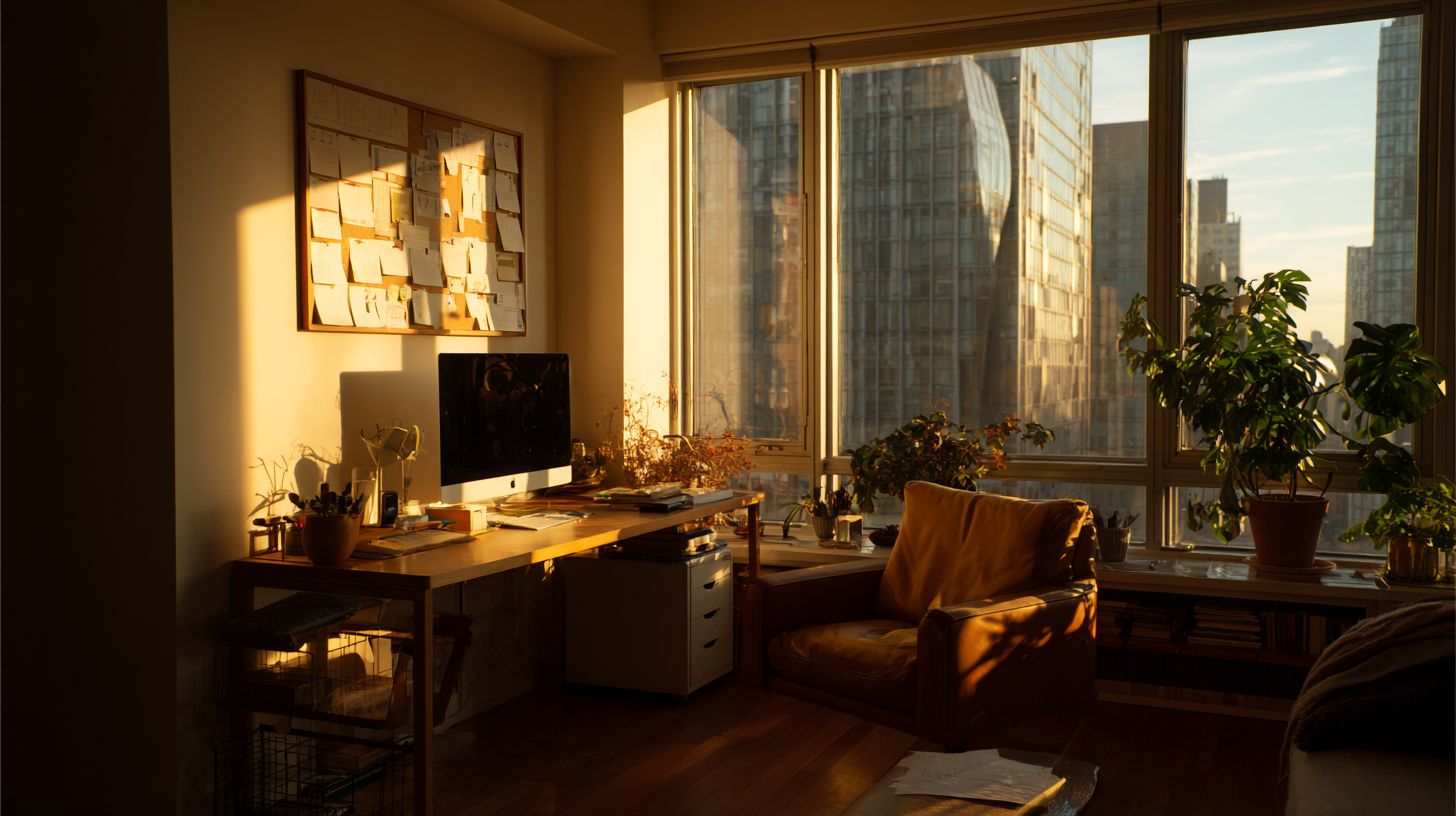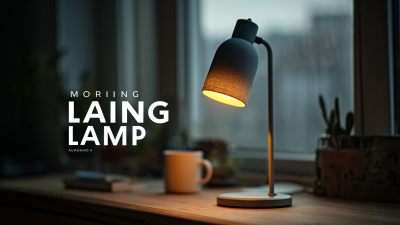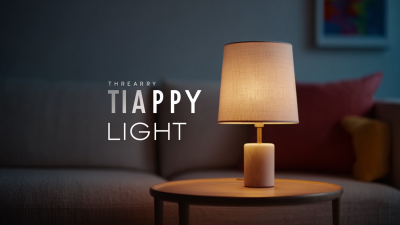How to Optimize Your Space with Sunshine Light for Better Productivity and Wellbeing
The use of "sunshine light" in workspace design has been shown to significantly enhance productivity and overall wellbeing. According to a report by the World Green Building Council, access to natural light in the workplace can boost employee productivity by up to 15%, while also reducing absenteeism and promoting mental health. Furthermore, research published in the Journal of Environmental Psychology indicates that environments infused with natural light improve cognitive function and mood, leading to a more dynamic and creative workplace. In a time when more organizations are recognizing the importance of employee wellbeing, optimizing office and home spaces with sunshine light presents an invaluable opportunity to tap into the myriad benefits derived from natural illumination. This article will explore effective strategies for harnessing sunshine light to create a more productive and healthier living and working environment.

Ways to Maximize Natural Light for Enhanced Workplace Productivity
Maximizing natural light in the workplace can significantly enhance productivity and wellbeing. One effective way to achieve this is by strategically positioning workstations near windows. By allowing employees to benefit from daylight, you not only reduce reliance on artificial lighting but also promote a more invigorating work atmosphere. Studies show that access to sunlight can improve mood, decrease fatigue, and increase focus, leading to higher overall output from team members.
Incorporating reflective surfaces can further enhance the distribution of natural light within an office space. Utilizing light-colored walls, desks, and décor can help bounce sunlight around the room, making the entire workplace feel more open and airy. Additionally, installing skylights or using transparent partitions can invite more light in, stimulating creativity and encouraging collaboration among employees. Emphasizing natural light in the design of a workspace creates an inviting environment that fosters both individual productivity and team dynamics.

The Science Behind Sunlight Exposure and Mental Health Benefits
Exposure to sunlight has profound effects on our mental health and overall wellbeing. According to a report by the American Psychological Association, regular sunlight exposure can significantly improve mood and decrease feelings of depression and anxiety. A study published in the Journal of Affective Disorders found that individuals who spend time in areas with abundant natural light experience a 20% reduction in depressive symptoms compared to those in less illuminated environments. This link can be attributed to sunlight's role in stimulating the production of serotonin, a neurotransmitter known to enhance mood.
Furthermore, sunlight exposure also regulates our circadian rhythms, influencing sleep quality and alertness during the day. Research from the National Sleep Foundation suggests that individuals who have access to natural light during their waking hours report better sleep quality. Enhanced sleep, in turn, promotes cognitive function and productivity. A study indicated that improved daylight exposure in workplace settings increased productivity by as much as 15%, demonstrating the importance of optimizing spaces with natural light for both mental health and efficiency. By harnessing the benefits of sunlight, individuals can cultivate environments that support their psychological and professional wellbeing.
Impact of Sunlight Exposure on Productivity and Mental Wellbeing
Tips for Designing Spaces that Optimize Daylight in Work Environments
Maximizing the benefits of natural daylight in work environments can significantly enhance both productivity and wellbeing. Incorporating sunlight into your workspace can create a more inviting atmosphere that fosters creativity and focus. Here are some essential tips for designing spaces that optimize daylight.
Firstly, consider the layout of your workspace. Position workstations near windows to harness natural light effectively. If possible, opt for open floor plans that allow light to filter through the space. Translucent partitions can also help distribute sunlight while maintaining privacy, creating a balanced environment that benefits all employees.
Secondly, utilize reflective surfaces to amplify daylight. Light-colored walls, mirrors, and glossy finishes can reflect sunlight deeper into the space, reducing the need for artificial lighting during the day. Incorporating plants can help create a harmonious connection with nature, adding an aesthetic appeal while improving air quality. Finally, consider adjustable window treatments that control glare without sacrificing the amount of light entering the room.
Utilizing Artificial Lighting to Complement Natural Sunlight for Wellbeing
Utilizing artificial lighting effectively can significantly enhance the benefits of natural sunlight, contributing to improved wellbeing and productivity in any space. By layering different types of artificial lights, such as ambient, task, and accent lighting, individuals can create a balanced atmosphere that mimics the dynamic qualities of daylight. For instance, during the early morning or late afternoon when natural light is less abundant, using warm LED lights can help maintain a sense of comfort and warmth, further promoting a positive working environment.
Moreover, the strategic placement of artificial light sources can help alleviate common issues associated with inadequate lighting, such as eye strain and fatigue. Incorporating daylight simulations—like daylight-mimicking bulbs—can also support the body's natural circadian rhythms, making it easier to stay alert and focused throughout the day. Additionally, it’s essential to allow for flexibility in lighting options; dimmable lights or smart lighting systems can adapt to varying tasks and moods, creating an optimal space that fosters creativity, concentration, and overall wellbeing.

Strategies for Evaluating and Adjusting Light Levels in Your Workspace
Evaluating and adjusting light levels in your workspace is essential for optimizing productivity and enhancing wellbeing. Start by assessing the natural light available in your environment. Observe how sunlight enters your space throughout the day and note areas that receive abundant light versus those that remain dim. This evaluation will help you identify spots where you can position your desk or workstations to take advantage of natural light, thereby reducing reliance on artificial sources.
Once you’ve identified the light distribution, consider implementing light-adjusting strategies. Utilize adjustable blinds or curtains to manage sunlight intensity, ensuring you can reduce glare while still benefiting from natural illumination. Supplement with task lighting in areas that remain underlit during the day. Opt for warm LED bulbs that mimic daylight, creating a balanced atmosphere conducive to focus and creativity. Regularly review your workspace layout and lighting setup, making adjustments as necessary to maintain an optimal balance that supports both productivity and overall wellbeing.
How to Optimize Your Space with Sunshine Light for Better Productivity and Wellbeing - Strategies for Evaluating and Adjusting Light Levels in Your Workspace
| Light Source | Optimal Lux Level | Benefits | Adjustment Strategies |
|---|---|---|---|
| Natural Sunlight | 300 - 500 lux | Improves mood, reduces fatigue | Adjust blinds, position desks near windows |
| LED Lighting | 500 - 1000 lux | Energy-efficient, versatile | Use dimmers, adjust color temperature |
| Fluorescent Lights | 300 - 750 lux | Cost-effective, broad-spectrum | Ensure proper maintenance, arrange fixtures |
| Task Lighting | 500 - 1000 lux | Targets focus areas, reduces eye strain | Use adjustable desk lamps, position near work |
| Ambient Lighting | 100 - 300 lux | Creates a welcoming atmosphere | Layer with other light sources, ensure even distribution |
Related Posts
-

Exploring Unique Features and Applications of the Best Morning Lamp Alternatives
-

7 Amazing Benefits of Using a Natural Lamp in Your Home
-

What is a Natural Lamp and How Does It Enhance Your Living Space?
-

Exploring the Future of Best Therapy Light Lamps in 2025 Industry Trends Insights
-

Exploring the Best Sunshine Lamp Alternatives for Your Home and Office
-

Exploring Unique Alternatives to Natural Lamps for Sustainable Lighting Solutions
